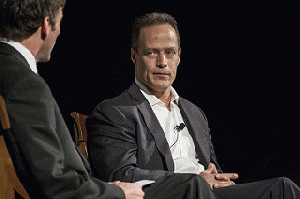Duluth, Minnesota (OpEdNews) May 29, 2016: C. G. Jung, M.D. (1875-1961), the Swiss psychiatrist and psychological theorist, claimed that the human psyche includes what he refers to as the collective unconscious. He famously worked out an approach (known as Jungian analysis) to helping individual persons integrate contents of the collective unconscious into their conscious awareness inasmuch as it is possible to do this.
But we should avoid romanticizing the collective unconscious, because not all impulses arising from the collective unconscious prompt us to engage in pro-social behavior. For this reason, we should carefully discern impulses arising from the collective unconscious. By discernment, I mean wrestling with impulses that come to us, as the biblical character Jacob famously wrestles with the angel of God who comes to him in his sleep.
Now, by definition, Jungian analysis involves one-to-one interactions between the analyst and the patient. However, Jung himself encouraged the formation of a social group known as a club in Zurich for various Jungian analysts and patients undergoing Jungian analysts.
The collective unconscious carries memories of our small-group hunter-gatherer ancestors that Darcia Narvaez in psychology at the University of Notre Dame writes about in her award-winning 2014 book Neurobiology and the Development of Human Morality: Evolution, Culture, and Wisdom (Norton).
By definition, our small-group hunter-gatherer ancestors were pre-literate and pre-philosophical people. They lived in what the American Jesuit cultural historian and theorist Walter J. Ong (1912-2003) refers to as primary oral cultures. To spell out the obvious, Ong belonged to the religious order of men in the Roman Catholic Church known as the Jesuits (known formally as the Society of Jesus). Perhaps we can liken the Jesuits, at least in spirit, to the spirit of the club in Zurich that Jung helped found.
In addition, Narvaez writes skillfully about the work of the American neurosurgeon Paul D. MacLean, M.D. (1913-2007). MacLean refers to the oldest evolutionary layer, or part, of the human brain as the reptilian brain. The reptilian brain is the biological base of our fight/flight/freeze response.
In the book Fighting for Life: Contest, Sexuality, and Consciousness (Cornell University Press, 1981), the published version of Ong's 1979 Messenger Lectures at Cornell University, Ong does not happen to advert explicitly to MacLean's work on the structure of the human brain. But the spirit of fighting for life is biologically based in the fight/flight/freeze response of the reptilian brain.
The part of the human psyche that Plato (428/427 to 348/347 BCE) and Aristotle (384-322 BCE) refer to as thumos (or thymos) is also biologically based in the fight/flight/freeze response of the human brain.
Now, in his new book Tribe: On Homecoming and Belonging (Twelve/ Hachette Book Group, 2016), Sebastian Junger, a journalist and war correspondent, writes elegantly about post-traumatic-stress disorder (PTSD) and suicide among soldiers returning from battle in war. No doubt PTSD and suicide among veterans of war are serious problems that deserve our attention. If Junger's elegant writing about these problems contributes to advancing public awareness and discussion of them, good for him -- more power to him.
Junger repeatedly discusses American Indians as examples of people who lived and worked together in tribes -- in Narvaez's terminology, small-group hunter-gatherers. His thesis is that soldiers in combat live and work together with one another in a way that he likens to American Indians living and working together with one another in a tribe. I understand the point of his analogy. However, as Junger understands, the draft would be a better analogy with tribal warriors than our all-volunteer armed forces are.
No doubt our small-group hunter-gatherer ancestors discussed by Narvaez lived and worked cooperatively with one another within their small groups in order to stay alive and perhaps flourish. No doubt they experienced a strong sense of belonging within their group -- a sense of belonging that most contemporary Americans rarely experience in any group they may belong to.
But Junger argues that American Indian tribes had ways of reintegrating warriors returning from battle into pro-social life again within the tribe that we Americans today do not have for reintegrating combat veterans back into pro-social life in American society. Oftentimes, returning combat veterans do not experience a sense of homecoming and belonging back in American society that is comparable in spirit and intensity to group bonding of soldiers in combat.
After all, most contemporary Americans have been detribalized, to put it mildly, by their American upbringing and social and cultural and educational conditioning. Even those of us who have NOT experienced the group bonding of soldiers in war may NOT have experienced strong and intense bonding with others in small groups to which we belong.
Of course critiques of so-called individualism in American life are a dime a dozen. Basically, Junger is adding his voice to such critiques. Nevertheless, he works out a fresh framework of thought for discussing the serious problems of PTSD and suicide among returning veterans of war.
In addition to favoring so-called individualism, we Americans of European descent are so detribalized that we tend to refer pejoratively to real or imagined so-called tribalism. For example, certain critics of the billionaire developer Donald Trump of New York, the Republican Party's presumptive presidential candidate in 2016, tend to characterize him and his political persona as representing authoritarianism and his enthusiastic supporters as representing the spirit of tribalism.
(Note: You can view every article as one long page if you sign up as an Advocate Member, or higher).





